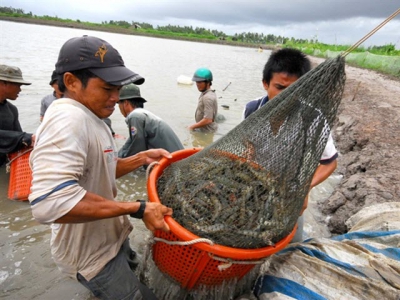Biological products help reducing diseases, environmental pollution in shrimp farming

The application of biological products in aquaculture, especially, in shrimp farming, is an effective way to reduce risks of diseases as well as minimising environmental pollution in the Mekong Delta.
Biological products contribute to the sustainable shrimp farming and environmental protection. Photo: NNVN.
Sustainable development of the shrimp industry based on the application of scientific and technical advances, especially the use of biological products, is an inevitable direction to increase value and profit for the shrimp breeders.
Nguyen Thi Hang, General Director of Bo De Seafood Joint Stock Company said currently, local breeders still raise shrimps in the traditional way, they often use lime, chemicals and antibiotics to treat the shrimp’s pond in many provinces of the Mekong Delta.
However, if they used improperly, it will accidentally create chemical and organic poisoning, she said.
Besides, the phenomenon of salinity has become more and more complicated in many provinces, including Ca Mau, Bac Lieu, Kien Giang.
It affects to the soil, limiting natural food sources of shrimp and resulting in low productivity, she said.
The company has started to invest in research in aquaculture in the delta since 2018, she added.
The company's point of view is that the improvement of water source and pond’s land is very important to raise shrimp effectively, she said.
On that basis, the company focuses on developing technology to solve problems in the shrimp farming process, she said.
It mainly concentrates on developing biotechnology with a breakthrough in operating principles towards balancing the pH, creating oxygen at the pond bottom, she said.
When the pond is rich in oxygen, beneficial microorganisms for shrimps will grow, helping the shrimps stay healthy and increasing the productivity, she said.
Then, the biological product named Mother Water was made, she said.
The product will help balance the pH, creating more oxygen at the bottom of the shrimp pond, so, the anaerobic environment will be suppressed or inhibited, she said.
As a result, shrimps have a good living environment, increasing resistance, she said.
Additionally, the natural food source for shrimps will be increased, she said.
Hang also said the winter’s temperature in the north region is very cold, sometimes it is only 7 to 10 degrees Celsius, therefore, when the product increases oxygen in the water, balancing the pH, the water temperature will be warmer.
Moreover, when adding the product to the shrimp feed, it will help shrimps in digesting well and make the shrimps grow well in the winter season, she said.
The biotechnological, named “Break all soil and water” of the product, will break the electronic bonds of soil and water. Thanks to that, many shrimp ponds do not need to be covered with canvas but still successfully raise the shrimps in the winter, she said.
Mindset change
Hang said, in addition to providing biological products for shrimp breeders, the company has also implemented many programmes to support local breeders to gradually raise their awareness and improve their techniques to ensure no risks during shrimp farming.
It can be named the project "Professionalisation of farmers" and the project "The idea of aspiration to build fragrant rice and clean shrimp areas" as the moves of the company to participate in the country’s strategy of building organic agriculture.
Under the project "Professionalisation of farmers", the company has co-operated with the National Agricultural Extension Centre, the People's Committee, the Agriculture and Rural Development Department of five provinces in the delta to directly instruct the local farmers.
The project has been operated since 2018 in Bac Lieu Province. Initially, the implementation encountered many difficulties. Therefore, the company has to come up with a policy to support farmers in all stages of production.
Even, the company signed a commitment with farmers participating in the project, if there is a risk, the company will write off all debts. Thanks to that effort, the project has been successful run and multiplied to neighbouring provinces of Soc Trang, Ca Mau and Kien Giang.
However, when the scope of the project was expanded, the company could not do it alone, then it co-ordinated with the National Agricultural Extension Centre and localities to run the project by introducing shrimp seed companies to join with local farmers.
Currently, Viet Nam has signed many international trade agreements, requiring products for export to meet very high requirements and criteria.
Therefore, with the principle that farmers are the core and most important in the supply chain linkage, the project will help them change their mindset, mastering their fields and participating in the market economy.
Related news
 Fishery exports projected to near 8.9 billion USD this year
Fishery exports projected to near 8.9 billion USD this year Shipments of fishery products are estimated to rake in 8.89 billion USD in 2021, posting a year-on-year rise of 5.7 percent
 Many tuna businesses divert exports to the Middle East
Many tuna businesses divert exports to the Middle East Since the beginning of the year, tuna exports to the Middle East have increased by 15% over the same period last year.
 Shrimp exports recover well at the end of the year
Shrimp exports recover well at the end of the year Despite having to fight the pandemic for safe production, Vietnam's shrimp exporters have made efforts to expand their markets